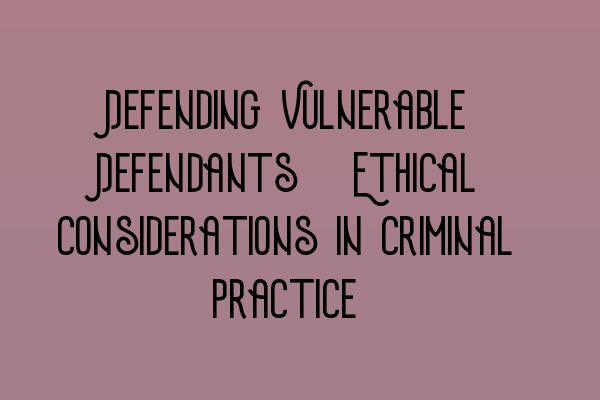Defending Vulnerable Defendants: Ethical Considerations in Criminal Practice
Introduction
As criminal defence solicitors, it is our duty to serve justice and uphold the principles of fairness, regardless of the circumstances. In this blog post, we will explore the ethical considerations that arise when defending vulnerable defendants in criminal practice.
Understanding Vulnerability
Vulnerability can manifest in various ways within a criminal justice context. It can arise from mental health issues, learning disabilities, language barriers, or socio-economic disadvantages. In order to provide effective representation, it is crucial for solicitors to recognize and address these vulnerabilities.
When representing vulnerable defendants, it is important to ensure that their rights are safeguarded throughout the legal process. This includes providing them with appropriate support, access to interpreters or translators if required, and ensuring that they fully understand the proceedings against them.
To further explore the issue of vulnerability in criminal practice, you can read our related article on SQE 1 Practice Exam Questions.
Ethical Obligations
Defending vulnerable defendants comes with unique ethical considerations. Solicitors must ensure that their clients have the capacity to instruct them, meaning they fully understand the implications of their case and can make informed decisions. If doubts arise regarding a defendant’s capacity, solicitors may need to seek additional support, such as mental health assessments.
Moreover, solicitors must always act in the best interests of their clients, especially when dealing with vulnerable individuals. This includes addressing any power imbalances and ensuring that defendants are treated fairly throughout the legal process.
For specific guidance on ethical obligations in criminal practice, SQE trainees can refer to our related article on SQE 1 Practice Mocks FLK1 FLK2.
Tailored Communication
Effective communication is key when defending vulnerable defendants. Solicitors should adapt their communication style to suit the needs of their clients. For example, a defendant with a learning disability may require information to be presented in a simplified manner, using visual aids or accessible language.
Furthermore, solicitors should consider cultural and linguistic differences when communicating with vulnerable defendants. If necessary, interpreters or translators should be employed to facilitate clear and accurate communication.
To enhance your understanding of tailored communication techniques, we recommend reading our related article on SQE 2 Preparation Courses.
Support and Welfare
The well-being of vulnerable defendants should be a priority for solicitors. It is essential to provide them with appropriate support and ensure that their rights are protected. This includes considering the impact of legal proceedings on their mental health and providing access to relevant support services.
Solicitors should be aware of available resources and organizations that can provide assistance to vulnerable defendants. By connecting clients with the appropriate support networks, solicitors can contribute to their overall well-being and help them navigate the criminal justice system.
To find out more about available support and welfare options, please refer to our related article on SQE 1 Preparation Courses.
Conclusion
Defending vulnerable defendants in criminal practice requires a thorough understanding of the ethical considerations involved. As solicitors, it is our duty to ensure that their rights are protected, their vulnerabilities are addressed, and they receive fair representation throughout the legal process.
For more information on the SQE exams and related resources, including exam dates, you can visit the SRA SQE Exam Dates page on our website.
